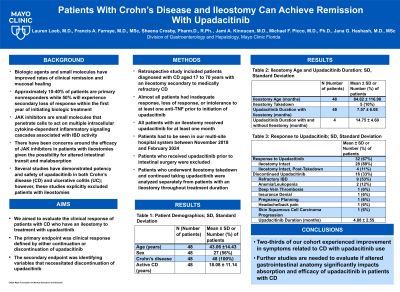Monday Poster Session
Category: IBD
P2574 - Patients With Crohn’s Disease and Ileostomy Can Achieve Remission With Upadacitinib
Monday, October 28, 2024
10:30 AM - 4:00 PM ET
Location: Exhibit Hall E

Has Audio

Jana G. Al Hashash, MD, MSc, FACG
Associate Professor
Mayo Clinic
Jacksonville, FL
Presenting Author(s)
Award: Presidential Poster Award
Lauren P. Loeb, MD1, Francis A. Farraye, MD, MSc2, Jami A. Kinnucan, MD, FACG2, Sheena K. Crosby, PharmD2, Michael F. Picco, PhD, MD2, Jana G. Hashash, MD, MSc2
1Mayo School of Graduate Medical Education, Jacksonville, FL; 2Mayo Clinic, Jacksonville, FL
Introduction: Recent studies have established a role for janus kinase (JAK) inhibitors in the management of patients with inflammatory bowel disease. However, these studies excluded patients with ileostomies. There is concern that given its formulation and small bowel transit time, upadacitinib absorption in patients with ileostomies may be decreased. We aim to evaluate the clinical response of patients with Crohn’s disease (CD) who have an ileostomy and were treated with upadacitinib.
Methods: This retrospective study included patients with CD who have an ileostomy secondary to medically refractory CD and who were treated with upadacitinib. Patients who underwent ileostomy takedown and continued taking upadacitinib were analyzed separately from patients with an ileostomy throughout treatment duration. The primary endpoint was clinical response defined by either continuation or discontinuation of upadacitinib. The secondary endpoint was identifying variables that necessitated discontinuation of upadacitinib.
Results: A total of 48 patients, between the ages of 17-70 years, met our inclusion criteria. The average duration of CD was 18 years (SD 11.14). Prior biologic failure included infliximab (78%), adalimumab (69%), ustekinumab (48%), vedolizumab (44%), certolizumab (25%), and tofacitinib (6%). Patients failed an average of 2.95 biologics (SD 1.40) before creation of ileostomy. The average amount of time from ileostomy creation to February 2024 was 84.6 months (SD 116.98). Of the 48 patients, 32 (67%) had clinical response in CD activity with upadacitinib use. Upadacitinib was discontinued in 16 (33%) patients for various reasons including refractory symptoms related to CD, deep vein thrombosis, anemia/leukopenia, insurance denial, pregnancy planning, headache/back pain, or squamous cell carcinoma of the skin.
Discussion: This is the first study to date to evaluate the clinical response of small molecule upadacitinib in patients with CD and an ileostomy secondary to medically refractory disease. Two-thirds of our cohort experienced improvement in symptoms related to CD with upadacitinib use. Further studies are needed to evaluate if altered gastrointestinal anatomy significantly impacts absorption and efficacy of small molecules in patients with CD.
Disclosures:
Lauren P. Loeb, MD1, Francis A. Farraye, MD, MSc2, Jami A. Kinnucan, MD, FACG2, Sheena K. Crosby, PharmD2, Michael F. Picco, PhD, MD2, Jana G. Hashash, MD, MSc2. P2574 - Patients With Crohn’s Disease and Ileostomy Can Achieve Remission With Upadacitinib, ACG 2024 Annual Scientific Meeting Abstracts. Philadelphia, PA: American College of Gastroenterology.
Lauren P. Loeb, MD1, Francis A. Farraye, MD, MSc2, Jami A. Kinnucan, MD, FACG2, Sheena K. Crosby, PharmD2, Michael F. Picco, PhD, MD2, Jana G. Hashash, MD, MSc2
1Mayo School of Graduate Medical Education, Jacksonville, FL; 2Mayo Clinic, Jacksonville, FL
Introduction: Recent studies have established a role for janus kinase (JAK) inhibitors in the management of patients with inflammatory bowel disease. However, these studies excluded patients with ileostomies. There is concern that given its formulation and small bowel transit time, upadacitinib absorption in patients with ileostomies may be decreased. We aim to evaluate the clinical response of patients with Crohn’s disease (CD) who have an ileostomy and were treated with upadacitinib.
Methods: This retrospective study included patients with CD who have an ileostomy secondary to medically refractory CD and who were treated with upadacitinib. Patients who underwent ileostomy takedown and continued taking upadacitinib were analyzed separately from patients with an ileostomy throughout treatment duration. The primary endpoint was clinical response defined by either continuation or discontinuation of upadacitinib. The secondary endpoint was identifying variables that necessitated discontinuation of upadacitinib.
Results: A total of 48 patients, between the ages of 17-70 years, met our inclusion criteria. The average duration of CD was 18 years (SD 11.14). Prior biologic failure included infliximab (78%), adalimumab (69%), ustekinumab (48%), vedolizumab (44%), certolizumab (25%), and tofacitinib (6%). Patients failed an average of 2.95 biologics (SD 1.40) before creation of ileostomy. The average amount of time from ileostomy creation to February 2024 was 84.6 months (SD 116.98). Of the 48 patients, 32 (67%) had clinical response in CD activity with upadacitinib use. Upadacitinib was discontinued in 16 (33%) patients for various reasons including refractory symptoms related to CD, deep vein thrombosis, anemia/leukopenia, insurance denial, pregnancy planning, headache/back pain, or squamous cell carcinoma of the skin.
Discussion: This is the first study to date to evaluate the clinical response of small molecule upadacitinib in patients with CD and an ileostomy secondary to medically refractory disease. Two-thirds of our cohort experienced improvement in symptoms related to CD with upadacitinib use. Further studies are needed to evaluate if altered gastrointestinal anatomy significantly impacts absorption and efficacy of small molecules in patients with CD.
Disclosures:
Lauren Loeb indicated no relevant financial relationships.
Francis Farraye: AbbVie – Consultant. Avalo Therapeutics – Consultant. Bausch – Advisor or Review Panel Member. BMS – Consultant. Braintree Labs – Consultant. DSMB for Lilly. – Sits on. Fresenius Kabi – Consultant. GI Reviewers and IBD Educational Group – independent contractor. GSK, Iterative Health, Janssen, Pfizer, Pharmacosmos, Sandoz Immunology, Sebela and Viatris – Consultant.
Jami Kinnucan: Abbvie – Advisory Committee/Board Member, Consultant. Fresinius kabi – Advisory Committee/Board Member, Consultant. J&J – Advisory Committee/Board Member, Consultant. Lilly – Advisory Committee/Board Member. Pfizer – Advisory Committee/Board Member, Consultant. Takeda – Advisory Committee/Board Member, Consultant. UCB – Consultant.
Sheena Crosby: Pharmacosmos – Advisory Committee/Board Member, Consultant.
Michael Picco indicated no relevant financial relationships.
Jana Hashash: Bristol Myers Squibb – Consultant.
Lauren P. Loeb, MD1, Francis A. Farraye, MD, MSc2, Jami A. Kinnucan, MD, FACG2, Sheena K. Crosby, PharmD2, Michael F. Picco, PhD, MD2, Jana G. Hashash, MD, MSc2. P2574 - Patients With Crohn’s Disease and Ileostomy Can Achieve Remission With Upadacitinib, ACG 2024 Annual Scientific Meeting Abstracts. Philadelphia, PA: American College of Gastroenterology.


